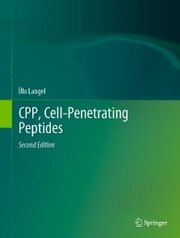<p>In this book, a summary and update of the most important areas of cell-penetrating peptides (CPP) research are presented, while raising relevant questions for further development. The CPP sequences are presented and discussed throughout the book. The methods for testing CPP mechanisms are discussed in detail. Various approaches for the testing of endocytotic pathways of CPP uptake are also described. Different CPP uptake experiments are compared since it is becoming clear that it is often best to apply several methods in a complementary manner in order to most comprehensively evaluate CPP uptake mechanisms due to the complexity of these processes. A brief summary of functionality issues of CPPs, both in vitro and in vivo, is discussed. Therapeutic potential of CPPs and commercial developments are discussed.</p><p>The present, second edition of this book is the updated and expanded version of the first edition, published in 2019. The development of the field of cell-penetrating peptides in these five years has been obvious and exciting.</p><p>This second edition of the book has been partly reorganized and comprehensively expanded with the exciting research in 2019-2023. Around 2500 novel scientific articles have become available, most of them are reviewed in the second edition. Additional rapidly growing areas of high impact presented in this second edition are therapeutic developments (Chapter 16) and delivery of oligonucleotides and proteins/peptides (Chapters 5 and 6) including novel reports on genome editing with CPP assistance. Also, several additional examples are available now on clinical trials using CPPs (Chapter 15).</p><p>The book is written for researchers and students in the field.</p><br><p></p>
Ülo Langel is a Professor Emeritus at the Department of Biochemistry and Biophysics, Stockholm University, and at the Institute of Technology, Tartu University. Prof. Langel graduated from Tartu University, Tartu, Estonia, as bioorganic chemist in 1974; he has received his PhD degree twice: in 1980 from Tartu University, Tartu, Estonia (bioorganic chemistry), and in 1993 from Tartu University/Stockholm University (biochemistry/neurochemistry). His professional experience includes a career at Tartu University, Tartu, Estonia (from junior research fellow to Associate Professor, Visiting Professor, and Professor 1974-now); The Scripps Research Institute, La Jolla, CA, USA (Associate Professor, and Adjunct Professor 2000-now); and Stockholm University (from research fellow to Associate Professor, Professor and Chairman, 1987-now). He is a Honorary Professor at Ljubljana University, Slovenia. He was a Chairman of the Board of small companies Pepfex (Stockholm) and Cepep (Estonia) and member of the Board of Orexo (Sweden). In 2013 he was elected a member of Academia Europaea and in 2015, a foreign member of the Estonian Academy of Sciences. Prof. Langel has been selected as a Fellow Member of International Neuropeptide Society (1995), and is a member of International Society for Neurochemistry, European Peptide Society, Swedish Biochemical Society and Estonian Biochemical Society. He has been awarded a White Star Order, 4th class, by Estonian Republic. He has been invited lecturer at numerous international conferences, and is a coauthor of more than 480 scientific articles and 20 approved or pending patents. His research interest is in neurochemistry where his research is aimed to study peptides, particularly neuropeptide receptors, and in drug delivery by cell-penetrating peptides
1. Introduction.- 2. Classes and applications of CPP.- 3. CPP selection, prediction and in silico analysis.- 4. Labeling of CPPs.- 5. Methods for CPP functionalization with oligonucleotides.- 6. Additional (gene therapeutic) platforms.- 7. Protein delivery and mimicry.- 8. General targeting strategies.- 9. Targeting specific barriers.- 10. Methods for molecular imaging, detection and visualization of CPPs.- 11. Methods for structural studies of CPPs.- 12. Kinetics.- 13. Toxicity and immune response.- 14. Cell-translocation mechanisms of CPPs.- 15. Clinical trials and commercialization using CPPs.- 16. Therapeutic potential of CPPs.- 17. CPP functionalized nanoparticles.- 18. Concluding remarks.
„E-Book“ steht für digitales Buch. Um diese Art von Büchern lesen zu können wird entweder eine spezielle Software für Computer, Tablets und Smartphones oder ein E-Book Reader benötigt. Da viele verschiedene Formate (Dateien) für E-Books existieren, gilt es dabei, einiges zu beachten.
Von uns werden digitale Bücher in drei Formaten ausgeliefert. Die Formate sind EPUB mit DRM (Digital Rights Management), EPUB ohne DRM und PDF. Bei den Formaten PDF und EPUB ohne DRM müssen Sie lediglich prüfen, ob Ihr E-Book Reader kompatibel ist. Wenn ein Format mit DRM genutzt wird, besteht zusätzlich die Notwendigkeit, dass Sie einen kostenlosen Adobe® Digital Editions Account besitzen. Wenn Sie ein E-Book, das Adobe® Digital Editions benötigt herunterladen, erhalten Sie eine ASCM-Datei, die zu Digital Editions hinzugefügt und mit Ihrem Account verknüpft werden muss. Einige E-Book Reader (zum Beispiel PocketBook Touch) unterstützen auch das direkte Eingeben der Login-Daten des Adobe Accounts – somit können diese ASCM-Dateien direkt auf das betreffende Gerät kopiert werden.
Da E-Books nur für eine begrenzte Zeit – in der Regel 6 Monate – herunterladbar sind, sollten Sie stets eine Sicherheitskopie auf einem Dauerspeicher (Festplatte, USB-Stick oder CD) vorsehen. Auch ist die Menge der Downloads auf maximal 5 begrenzt.






